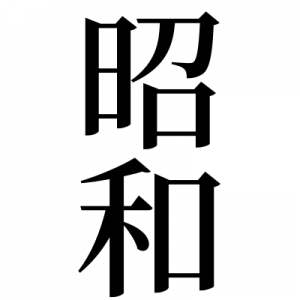Meaning In Japanese, 月が綺麗ですね (tsuki ga kirei desu ne) literarily means “The moon is beautiful, isn’t it?”. Surprisingly, however, it could also contain the hidden meaning — “I love you”. Origin It is widely believed that the romantic meaning of “The moon is beautiful, isn’t it?” in Japanese was coined by Sōseki Natsume (夏目漱石), a renowned Japanese novelist in the 19-20th century who was portrayed in the former 1000 yen banknote. Allegedly, its origin traces back to when he used to work as an English teacher — when he saw his student directly translating “I love you” into Japanese, he supposedly said, “Japanese people never say things like that shamelessly….Read More
Meaning and Origin of Reiwa, Heisei and Shōwa, Japan’s Imperial Eras
This post explains Japan’s imperial era (gengō) and also briefly describes the origins, meanings and zeitgeists of the latest eras ‘Reiwa’, ‘Heisei’ and ‘Shōwa’. What’s 元号 (Gengō)? Japan’s imperial era is called 元号 (gengō). It is used alongside the Western calendar in official documents such as drivers’ licenses and health insurance cards. Usually, the era ends upon the death of each emperor and followed by the enthronement of his successor, but the current era ‘令和’ has started following the abdication of Emperor Akihito. How the name of gengō is coined Japan’s era name is determined after a great number of discussions among scholars, experts and cabinet members. There are also…Read More
Meaning and Origin of 平成 (Heisei)
Meaning and Origin of 平成 (Heisei) The name of ‘平成‘ (Heisei) reflects the wish for world peace. It was coined in reference to two Chinese phrases ‘内平外成’ meaning ‘peace inside and prosperity outside’ and ‘地平天成’ meaning ‘the peaceful and prosperous world’. The former appears in ‘書経’ (‘Shujing’,‘The Book of Documents’), and the latter in 史記 (‘Shiji’, ‘The Records of the Grand Historian’), both of which are ancient Chinese literature. The Zeitgeist of Heisei Era Bubble Economy The Heisei era got off to an auspicious start, with Japan’s over-inflated economy reaching its pinnacle. At the time, the top 5 companies by market capitalization in the world were all Japanese, and the…Read More
Origin and Meaning of the Japanese Era “Shōwa (昭和)”
昭和 (Shōwa) is the Japanese imperial era that spanned 62 years from December 25th, 1926 to January 7th, 1989.Read More
Meaning and Origin of Reiwa (令和) Era in Japanese
Today, Chief Cabinet Secretary Yoshihide Suga has announced the name of Japan’s new era, ‘令和’ (Reiwa). The new era is set to start on May 1, when Crown Prince Naruhito will become the new Emperor after Emperor Akihito abdicates on April 30. 令和 will be the 248th era in the history of Japan.Read More



